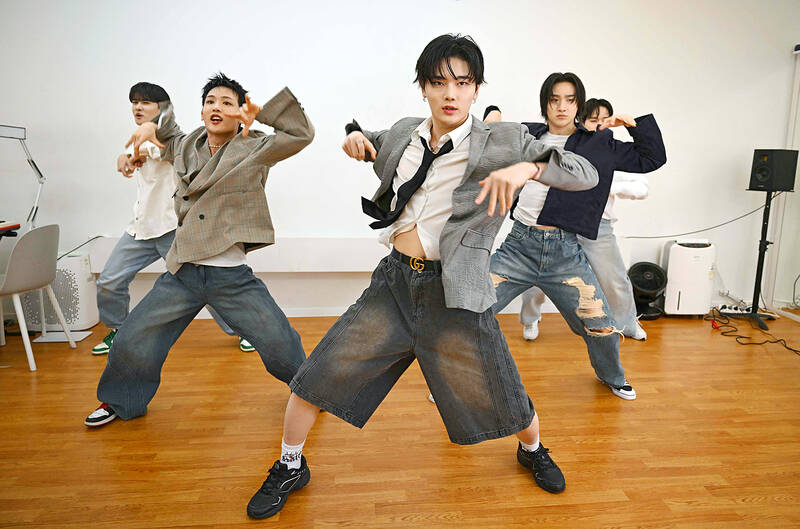Growing up in North Korea, Hyuk’s childhood was about survival. He never listened to banned K-pop music but, after defecting to the South, he’s about to debut as an idol.
Hyuk is one of two young North Koreans in a new K-pop band called 1Verse — the first time that performers originally from the nuclear-armed North have been trained up for stardom in South Korea’s global K-pop industry.
Before he was 10, Hyuk — who like many K-pop idols now goes by one name — was skipping school to work on the streets in his native North Hamgyong province and admits he “had to steal quite a bit just to survive.”

Photo: AFP
“I had never really listened to K-pop music”, he said, explaining that “watching music videos felt like a luxury to me. My life was all about survival,” he said, adding that he did everything from farm work to hauling shipments of cement to earn money to buy food for his family.
But when he was 13, his mother, who had escaped North Korea and made it to the South, urged him to join her.
He realized this could be his chance to escape starvation and hardship, but said he knew nothing about the other half of the Korean peninsula.

Photo: AFP
“To me, the world was just North Korea — nothing beyond that,” he said.
His bandmate, Seok, also grew up in the North — but in contrast to Hyuk’s hardscrabble upbringing, he was raised in a relatively affluent family, living close to the border.
As a result, even though K-pop and other South Korean content like K-dramas are banned in the North with harsh penalties for violators, Seok said “it was possible to buy and sell songs illegally through smugglers.”
Thanks to his older sister, Seok was listening to K-pop and even watching rare videos of South Korean artists from a young age, he said.
“I remember wanting to imitate those cool expressions and styles — things like hairstyles and outfits,” Seok said.
Eventually, when he was 19, Seok defected to the South. Six years later, he is a spitting image of a K-Pop idol.
STAR QUALITY
Hyuk and Seok were recruited for 1Verse, a new boy band and the first signed to smaller Seoul-based label Singing Beetle by the company’s CEO Michelle Cho.
Cho was introduced to both of the young defectors through friends.
Hyuk was working at a factory when she met him, but when she heard raps he had written she said that she “knew straight away that his was a natural talent.”
Initially, he “professed a complete lack of confidence in his ability to rap,” Cho said, but she offered him free lessons and then invited him to the studio, which got him hooked.
Eventually, “he decided to give music a chance,” she said, and became the agency’s first trainee.
In contrast, Seok “had that self-belief and confidence from the very beginning,” she said, and lobbied hard to be taken on.
When Seok learned that he would be training alongside another North Korean defector, he said it “gave me the courage to believe that maybe I could do it.”
‘WE’RE ALMOST THERE’
The other members of 1Verse include a Chinese-American, a Lao-Thai American and a Japanese dancer. The five men in their 20s barely speak each other’s languages.
But Hyuk, who has been studying English, says it doesn’t matter.
“We’re also learning about each other’s cultures, trying to bridge the gaps and get closer little by little,” he said.
“Surprisingly, we communicate really well. Our languages aren’t perfectly fluent, but we still understand each other. Sometimes, that feels almost unbelievable.”
Aito, the Japanese trainee who is the main dancer in the group, said he was “fascinated” to meet his North Korean bandmates.
“In Japan, when I watched the news, I often saw a lot of international issues about defectors, so the overall image isn’t very positive,” he said.
But Aito said his worries “all disappeared” when he met Hyuk and Seok. And now, the five performers are on the brink of their debut.
It’s been a long road from North Korea to the cusp of K-pop stardom in the South for Hyuk and Seok — but they say they are determined to make 1Verse a success.
“I really want to move someone with my voice. That feeling grows stronger every day,” Seok said.
Hyuk said being part of a real band was a moving experience for him.
“It really hit me, like wow, we’re almost there.”

The 1990s were a turbulent time for the Chinese Nationalist Party’s (KMT) patronage factions. For a look at how they formed, check out the March 2 “Deep Dives.” In the boom years of the 1980s and 1990s the factions amassed fortunes from corruption, access to the levers of local government and prime access to property. They also moved into industries like construction and the gravel business, devastating river ecosystems while the governments they controlled looked the other way. By this period, the factions had largely carved out geographical feifdoms in the local jurisdictions the national KMT restrained them to. For example,

The remains of this Japanese-era trail designed to protect the camphor industry make for a scenic day-hike, a fascinating overnight hike or a challenging multi-day adventure Maolin District (茂林) in Kaohsiung is well known for beautiful roadside scenery, waterfalls, the annual butterfly migration and indigenous culture. A lesser known but worthwhile destination here lies along the very top of the valley: the Liugui Security Path (六龜警備道). This relic of the Japanese era once isolated the Maolin valley from the outside world but now serves to draw tourists in. The path originally ran for about 50km, but not all of this trail is still easily walkable. The nicest section for a simple day hike is the heavily trafficked southern section above Maolin and Wanshan (萬山) villages. Remains of

With over 100 works on display, this is Louise Bourgeois’ first solo show in Taiwan. Visitors are invited to traverse her world of love and hate, vengeance and acceptance, trauma and reconciliation. Dominating the entrance, the nine-foot-tall Crouching Spider (2003) greets visitors. The creature looms behind the glass facade, symbolic protector and gatekeeper to the intimate journey ahead. Bourgeois, best known for her giant spider sculptures, is one of the most influential artist of the twentieth century. Blending vulnerability and defiance through themes of sexuality, trauma and identity, her work reshaped the landscape of contemporary art with fearless honesty. “People are influenced by

Ten years ago, English National Ballet (ENB) premiered Akram Khan’s reimagining of Giselle. It quickly became recognized as a 21st-century masterpiece. Next month, local audiences get their chance to experience it when the company embark on a three-week tour of Taiwan. Former ENB artistic director Tamara Rojo, who commissioned the ballet, believes firmly that if ballet is to remain alive, works have to be revisited and made relevant to audiences of today. Even so, Khan was a bold choice of choreographer. While one of Britain’s foremost choreographers, he had never previously tackled a reimagining of a classical ballet, so Giselle was